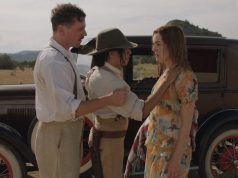If you were a teacher and “Blue Like Jazz” were a paper handed in by a student, you’d wish you could disregard the usual criteria and grade it solely on its thought-provoking ideas and good intentions. To put it another way, it’s a shame that a story with such an intriguing perspective on religious faith was squandered on such a heavy-handed and didactic movie.
Based on Donald Miller’s book of autobiographical essays, the film stars Marshall Allman as Miller, a 19-year-old Houston boy raised by his mother (Jenny Littleton) to be a devout Baptist. “Back in Texas I knew everything,” Don tells us. “Because I was from Texas.” Spurred by his hippie absentee father (Eric Lange) to expand his horizons, and all-too-suddenly disillusioned with organized religion, Don moves to Portland to attend Reed College, a liberal-arts school that’s the opposite of the Christian university he had originally planned to attend.
Reed College is a real place, and the film’s withering view of it as a freewheeling campus of kooks is only a slight exaggeration. (We Portlanders sometimes call it Weed College, if you catch my drift.) Don, all wide-eyed and virginal, is bemused by the co-ed bathrooms, the anti-bottled-water activists, the open-discussion classrooms, the offbeat extracurricular activities like Malaysian cocktail tennis and Vietnam War reenactment. He finds it easy to slip away from his religious devotion — prudent, even, since his new lesbian friend Lauryn (Tania Raymonde) says flat-out that Christians tend to stay hidden while at Reed. The super-tolerant, super-liberal student body doesn’t have much patience for mainstream Christianity.
Though the film is about on Don’s crisis of faith, it doesn’t follow the usual path, at least not at first. Dramatizations of spiritual journeys tend to make it look like an either/or prospect: either you adhere to everything you’ve been taught, or you forsake every last bit of it. But real life isn’t nearly that tidy, and “Blue Like Jazz” is notable for exploring the nuances. Not all irreligious people are directionless; not all Christians are charitable; not all peacenik protest-marching activists are godless heathens; not all organized religion is corrupt. Don’s potential love interest, a humanitarian crusader named Penny (Claire Holt), helps him figure it out.
But eventually we lapse into a simplistic, black-and-white view of the world. Lauryn’s frank “we don’t like your kind around here” declaration is the start of it, and more creeps in gradually over the course of the movie. The preachiness and moralizing that director Steve Taylor and co-writer Ben Pearson avoided at first arrives in full force, coming from a different angle than most Christian-themed films but coming nonetheless. (Taylor and Pearson’s previous film, “The Second Chance,” is a better example of how to do this kind of thing.) There’s also some clunky plotting with The Pope (Justin Welborn), a Reed acquaintance of Don’s who acts as ironic religious leader for the school’s ironic student body.
The lessons that Don learns about himself and his faith are worthy of discussion, and they ring true, at least for this believer. I haven’t read Miller’s book, but I suspect his reflections work better as insightful sermons or inspiring lectures than they do as drama. The film’s heart is in the right place; it just can’t make the rest of its parts function smoothly.
C (1 hr., 47 min.; )
Reprinted from Film.com





